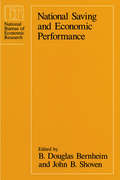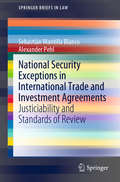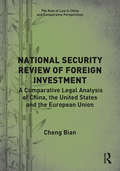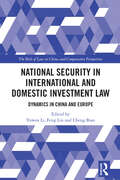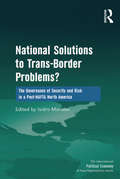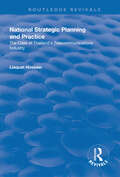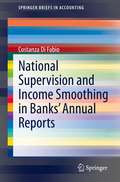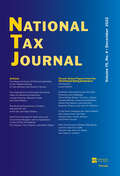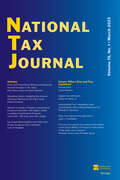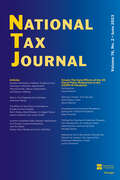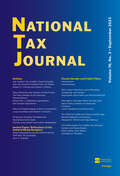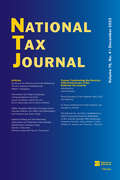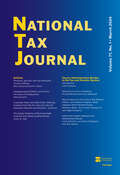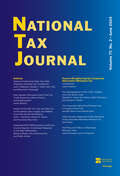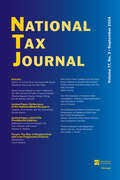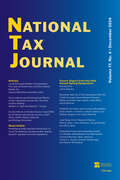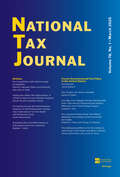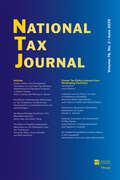- Table View
- List View
National Policy, Global Giants: How Australia Built and Lost its Automotive Industry
by John Wormald Kim RennickWhat can we tell about the future of automobiles and the industries that make them by examining their past? Wormald and Rennick trace the history of powered land transport, the rise and fall of the railways, the spectacular rise of the automobile, and what might come next. Delving into the mighty and complex automotive industry, following the growth of the markets and production, this book illustrates the globalization of vehicle manufacturers and component suppliers, giving form to the development of the industry's business model. A key factor in an auto-industry's successes and failures is the often-difficult relationship it has with government, which varies in nature from country to country. As an illustrative case, Wormald and Rennick present and analyse the entire lifecycle of Australia's automotive history – including its birth, growth, functioning and death - and its shifting relationship with the government that supported it.
National Project Management: The Sunshine Project and the Rise of the Japanese Solar Industry (Advances in Japanese Business and Economics #25)
by Minoru ShimamotoThis book clarifies the challenges and outcomes of the Sunshine Project, a national project in Japan for developing new energy that was launched about 40 years ago at the time of the first oil crisis in the early 1970s and ended, as planned, in the early 2000s. The Sunshine Project was the government’s national project for developing new energy technologies such as solar energy and other natural energy sources—what we call renewable energy today. The book considers why policies were successful in some areas but did not have the intended effect in other areas. It explains how technology innovation was employed to achieve energy policy goals and to tackle environmental issues. If we can present suggestions for how to structure national projects, it may also be possible to identify ways for industry, government, and academia to come together to find solutions not only to environmental energy problems, but also to other social problems. Herein lies the goal of this book. Although the development of new energy is the main subject of the book, the author also scrutinizes the governmental decision-making process involved in planning policy, the creative process, and the design of systems of collaboration between industry, government, and academia as well as cases where corporations have developed commercial versions of new energy products. The main part of the book consists of three case studies interspersed with two reflective chapters. The first case study describes the Sunshine Project from the perspective of project management based on the perspective of government. The second case study is a detailed examination of the routines in all organizations, whether industry, government, or academia, and of the autonomy of the project organization. The third case study increases the degree of detail to focus on the smallest unit of analysis, the intentions and motivations of key individuals participating in the project.
National Regulation of Space Activities
by Ram S. JakhuThis book comprehensively addresses all aspects of national space laws and regulations governing the conduct of space activities in fifteen space-faring nations. This is the first book of its kind that contains a compilation of materials written from a neutral and objective perspective by the world's leading space law experts selectively drawn from the fifteen countries whose laws and regulations are covered by the book. In order to provide the reader with a full understanding and appreciation of the various relevant national laws and regulations that govern space activities, this book explores the policies and rationales underlying the law, constitutional basis for the adoption of national space laws, some facts about national space activities in the respective countries, and as well, discusses the relevant principles and rules of international space law in order to bring to light the international context of the national laws described. Since the U.S. presently has the most developed and extensive regime of national space laws and regulations, six chapters of this book are devoted to a thorough examination of those laws and regulations. The unique feature of this compilation is that, apart from the description of applicable national laws and regulations on space activities that it provides, it also sets out the various procedures to be followed particularly by domestic and foreign private entities in order to achieve compliance with the numerous and varied national legal requirements concerning space activities. This work will be a valuable resource not only to students, researchers and academics in the fields of space law and regulation, but also to space industry executives, specialist lawyers, foreign ministries as well as international organizations, such as the United Nations.
National Saving and Economic Performance
by John B. Shoven B. Douglas BernheimThe past decade has witnessed a decline in saving throughout the developed world—the United States has the dubious distinction of leading the way. The consequences can be serious. For individuals, their own economic security and that of their families is jeopardized. For society, inadequate rates of saving have been blamed for a variety of ills—decreasing the competitive abilities of American industry, slowing capital accumulation, increasing our trade deficit, and forcing the sale of capital stock to foreign investors at bargain prices. Restoring acceptable rates of saving in the United States poses a major challenge to those who formulate national economic policy, especially since economists and policymakers alike still understand little about what motivates people to save. In National Saving and Economic Performance, edited by B. Douglas Bernheim and John B. Shoven, that task is addressed by offering the results of new research, with recommendations for policies aimed to improve saving. Leading experts in diverse fields of economics debate the need for more accurate measurement of official saving data; examine how corporate decisions to retain or distribute earnings affect household-level consumption and saving; and investigate the effects of taxation on saving behavior, correlations between national saving and international investment over time, and the influence of economic growth on saving. Presenting the most comprehensive and up-to-date research on saving, this volume will benefit both academic and government economists.
National Security Exceptions in International Trade and Investment Agreements: Justiciability and Standards of Review (SpringerBriefs in Law)
by Sebastián Mantilla Blanco Alexander PehlThis book provides a comprehensive analysis of national security exceptions in international trade and investment agreements. The subject has gained particular relevance in the past few years, as both the United States and the Russian Federation have invoked national security as justification for trade-restrictive measures in the context of WTO dispute settlement proceedings. The book describes the evolution of security exceptions in international economic law, from the GATT 1947 to the most recent economic treaties, such as the 2017 Buenos Aires Protocol for Intra-Mercosur Investment and the 2018 USMCA. Further, it presents an overview of the rich array of adjudicatory practices addressing national security clauses, covering the decisions of WTO dispute settlement bodies, the ICJ, and numerous investment arbitral tribunals. To this end, the book addresses the debates surrounding the alleged self-judging character of security exceptions and the standards of review applicable where the exception is considered to be justiciable.
National Security Review of Foreign Investment: A Comparative Legal Analysis of China, the United States and the European Union (The Rule of Law in China and Comparative Perspectives)
by Cheng BianIn recent years, China, the US, and the EU and its Member States have either promulgated new national laws and regulations or drastically revised existing ones to exert more rigorous government control over inward foreign direct investment (FDI). Such government control pertains to the establishment of an ex-ante review regime of FDI in the host state in sectors that are considered as ‘sensitive’ or ‘strategic’, with an aim to mitigate the security-related implications. This book conducts a systematic and up-to-date comparative study of the national security review regimes of China, the US, and the EU, using Germany as an exampling Member State. It answers a central research question of how domestic law should be formulated to adequately protect national security of the host state whilst posing minimum negative impacts to the free flow of cross-border investment. In addition to analyzing the latest development of the national security review regimes in aforementioned jurisdictions and identifying their commonalities and disparities, this book establishes a normative framework regarding the design of a national security review regime in general and proposes specific legislative recommendations to further clarify the law. This book will be of interest to scholars in the field of international and comparative investment law, investors who seek better compliance programs in the host state, and policymakers who aim for high-quality regulation on foreign investment.
National Security in International and Domestic Investment Law: Dynamics in China and Europe (The Rule of Law in China and Comparative Perspectives)
by Feng Lin Yuwen Li Cheng BianThis book offers a dynamic introduction to the new developments on national security review of foreign direct investment (FDI) from the perspectives of both domestic law and international investment law. COVID-19 and the Russian invasion of Ukraine have intensified FDI screening to an unprecedented scale, yet its purposes, scope and potential impact remain ambiguous and controversial. The book first attests the legitimacy of FDI screening by using the theory of National Security Constitution. Part I explicates the national security, public order and public health exceptions clauses in international investment law and the novel EU Regulation on FDI screening. Part II provides an in-depth analysis of FDI screening in China, France, Germany, Italy, the Netherlands, Poland and the UK, which have either witnessed momentous changes in domestic law recently or have adopted new laws to cope with the growing security concerns. The book illustrates how States and the EU are using legal instruments to tackle exigent and emerging challenges and the complexity of national security emanated from foreign investment, in the context of evolving disruptive digital technologies and the structural change of the global economy. The volume will be of great value to a wide range of audiences including academics in investment and trade law, legal practitioners, in-house counsels, policymakers, business professionals and law and business students at the graduate level.
National Semiconductor's India Design Center
by Liz Kind Jeffrey T. PolzerThe senior managers of the India Design Center used 360-degree feedback to develop their team competencies. Now, three new managers are about to join their management team, and Ashok Kumar, director of the center, must decide how to integrate the new managers in a way that maintains the team's newfound trust and camaraderie. Describes the managers' work activities, including engineering, human resources, and finance responsibilities, to allow a diagnosis of how the managers can benefit from working together as a team. Also notes the challenges these managers face as they work with their bosses and counterparts at the company's headquarters in California, which is 13.5 time zones away. The team is one that could presumably benefit from better cross-functional coordination and communication regarding their collective relationship with the company's headquarters in California.
National Solutions to Trans-Border Problems?: The Governance of Security and Risk in a Post-NAFTA North America (The International Political Economy of New Regionalisms Series)
by Isidro Morales'Triggered by the North American Free Trade Agreement (NAFTA), Canada, the United States and Mexico redefined their public policies to facilitate the regionalization of transactions. However, this volume addresses the institutional gaps that still remain focusing mainly on the cross-border governance of security aspects. It gathers interdisciplinary contributions of specialists working on continental issues within Canada, the United States and Mexico and highlights the transnational dimension of certain issues still managed under national-framed policies. Furthermore, it explores the possibilities and constraints for moving public policy into new cross-border governance strategies. Divided in three parts, the first part assesses what is at stake in cross-border governance issues and whether the integrative trend in the region will be maintained or stalled in the years to come. The second part explores the growing scope of security problems interconnected with borders, migration, energy and drug trafficking across the region. It highlights how Mexico and Canada are responding or adapting their policy choices to a continental security approach framed by the US after the terrorist attacks of September 11, and to the major concerns of the Obama administration. The third part focuses on the governance of territorial borders and bilateral affairs, i.e. Mexico-US and Canada-Mexico relations.
National Storage Affiliates: The REIT IPO Decision
by Charles F Wu Gregory Himmel Max de la BruyereCase
National Strategic Planning and Practice: The Case of Thailand's Telecommunications Industry (Routledge Revivals)
by Liaquat HossainThis title was first published in 2001. This text explores the relationship between telecommunications strategic planning process (TSPP), the organization and the environment for developing an understanding of the idea of a national TSPP (NTSPP) in Thailand. The overall aim is to explore an understanding of an NTSPP by providing a detailed study of the strategic planning and practices of the Thai telecom regulators during the period from 1954 to 1996. It applies the strategic planning process principles to further the understanding of NTSPP in Thailand. By using the SPP framework, the study develops a theoretical TSPP framework for analyzing the underlying TSPP strategies within the national telecom regulators in Thailand. It also seeks to illustrate the limitations of the traditional strategic planning theory when applied to NTSPP. From a theoretical perspective, this book illustrates that a lack of formalization and consensus in Thailand's NTSPP is the fundamental backlog for the successful operation of its industry.
National Strategies to Harness Information Technology
by Nagy K. Hanna Peter T. KnightThe ability to harness Information Communication Technologies (ICTs) is increasingly at the heart of competitiveness and sustainable growth. As countries engage in an increasingly competitive global economy, they are trying to weave ICT into their development strategies, in the same way enterprises have learned to use ICT to transform their business models and strategies. This integration offers a new path to development that is responsive to the challenges of our times. In National Strategies to Harness Information Technology, Nagy Hanna and Peter Knight provide a framework for assessing the opportunities, challenges, and prospects for "e-transformation" and for analyzing the options and innovations adopted to manage the e-transformation process. They ask hard questions: what does it take to harness ICT to transform an economy? Why some countries accelerate their development journey with ICT while others fail? How did successful countries balance the need for strategic leadership with bottom up innovation? Can countries reduce the risks of digital divide? What have been the roles of government and private sectors? What lessons can be learned for countries at different levels of development? Featuring contributions from country experts, the editors and authors provide in-depth case studies of ICT deployment in Singapore, Finland, the Philippines, and South Africa, and asses the progress of such efforts. The result is an essential resource for academic researchers, policy analysts, policymakers, and industry leaders interested in the role of ICT in national development, innovation, and economic growth. In National Strategies to Harness Information Technology, Nagy Hanna and Peter Knight provide a framework for assessing the opportunities, challenges, and prospects for "e-transformation" and for analyzing the options and innovations adopted to manage the e-transformation process. They ask hard questions: what does it take to harness ICT to transform an economy? Why some countries accelerate their development journey with ICT while others fail? How did successful countries balance the need for strategic leadership with bottom up innovation? Can countries reduce the risks of digital divide? What have been the roles of government and private sectors? What lessons can be learned for countries at different levels of development? Featuring contributions from country experts, the editors and authors provide in-depth case studies of ICT deployment in Singapore, Finland, the Philippines, and South Africa, and asses the progress of such efforts. The result is an essential resource for academic researchers, policy analysts, policymakers, and industry leaders interested in the role of ICT in national development, innovation, and economic growth.
National Success in Elite Sport: Exploring the Factors that Lead to Success
by Michel Raspaud Nadim NassifThis book takes a deep dive into the factors that lead to countries’ success in elite sport. While some researchers have suggested looking at the political, economic, demographic, geographic and cultural characteristics of a country, other scholars have advocated that meso-level strategies such as financial support, governance, and talent identification systems are the factors that need to be taken into consideration. Taking into account the two sides of this debate, the authors review and evaluate these various components. They go on to use this review to propose a new holistic framework of analysis that includes the macro, meso and micro-level factors that lead to national success in elite sport. This is a valuable resource for researchers and students interested in sport management, particularly the subject of sport governance. In addition, sports consultants and policymakers will find this to be an eye-opening read.
National Supervision and Income Smoothing in Banks’ Annual Reports (SpringerBriefs in Accounting)
by Costanza Di FabioThis book deals with the debated relationship between the characteristics of national supervision and manipulative practices in banks’ annual reports, with a specific focus on income smoothing. The issue is quite challenging as, since the 2008 financial crisis, governmental bodies and regulators have stressed the crucial role of supervision for bank transparency purposes, but the effect of supervision on accounting manipulation is still discussed. Focusing on European banks, the book investigates whether the characteristics of national supervision affect bank propensity to smooth income, also considering the potential role of bank business models. By exploring a broad range of national supervision’s characteristics, the book presents a comprehensive view on the influence of country-level institutional settings on a form of earnings management widely used across the banking industry.
National Tax Journal, volume 75 number 4 (December 2022)
by National Tax JournalThis is volume 75 issue 4 of National Tax Journal. The goal of the National Tax Journal (NTJ) is to encourage and disseminate high quality original research on governmental tax and expenditure policies. The journal publishes peer reviewed articles that include economic, theoretical, and empirical analyses of tax and expenditure issues with an emphasis on policy implications. Each issue includes a Forum, which consists of invited papers by leading scholars that examine in depth a single current tax or expenditure policy issue. The NTJ has been published quarterly since 1948 under the auspices of the National Tax Association (NTA).
National Tax Journal, volume 76 number 1 (March 2023)
by National Tax JournalThis is volume 76 issue 1 of National Tax Journal. The goal of the National Tax Journal (NTJ) is to encourage and disseminate high quality original research on governmental tax and expenditure policies. The journal publishes peer reviewed articles that include economic, theoretical, and empirical analyses of tax and expenditure issues with an emphasis on policy implications. Each issue includes a Forum, which consists of invited papers by leading scholars that examine in depth a single current tax or expenditure policy issue. The NTJ has been published quarterly since 1948 under the auspices of the National Tax Association (NTA).
National Tax Journal, volume 76 number 2 (June 2023)
by National Tax JournalThis is volume 76 issue 2 of National Tax Journal. The goal of the National Tax Journal (NTJ) is to encourage and disseminate high quality original research on governmental tax and expenditure policies. The journal publishes peer reviewed articles that include economic, theoretical, and empirical analyses of tax and expenditure issues with an emphasis on policy implications. Each issue includes a Forum, which consists of invited papers by leading scholars that examine in depth a single current tax or expenditure policy issue. The NTJ has been published quarterly since 1948 under the auspices of the National Tax Association (NTA).
National Tax Journal, volume 76 number 3 (September 2023)
by National Tax JournalThis is volume 76 issue 3 of National Tax Journal. The goal of the National Tax Journal (NTJ) is to encourage and disseminate high quality original research on governmental tax and expenditure policies. The journal publishes peer reviewed articles that include economic, theoretical, and empirical analyses of tax and expenditure issues with an emphasis on policy implications. Each issue includes a Forum, which consists of invited papers by leading scholars that examine in depth a single current tax or expenditure policy issue. The NTJ has been published quarterly since 1948 under the auspices of the National Tax Association (NTA).
National Tax Journal, volume 76 number 4 (December 2023)
by National Tax JournalThis is volume 76 issue 4 of National Tax Journal. The goal of the National Tax Journal (NTJ) is to encourage and disseminate high quality original research on governmental tax and expenditure policies. The journal publishes peer reviewed articles that include economic, theoretical, and empirical analyses of tax and expenditure issues with an emphasis on policy implications. Each issue includes a Forum, which consists of invited papers by leading scholars that examine in depth a single current tax or expenditure policy issue. The NTJ has been published quarterly since 1948 under the auspices of the National Tax Association (NTA).
National Tax Journal, volume 77 number 1 (March 2024)
by National Tax JournalThis is volume 77 issue 1 of National Tax Journal. The goal of the National Tax Journal (NTJ) is to encourage and disseminate high quality original research on governmental tax and expenditure policies. The journal publishes peer reviewed articles that include economic, theoretical, and empirical analyses of tax and expenditure issues with an emphasis on policy implications. Each issue includes a Forum, which consists of invited papers by leading scholars that examine in depth a single current tax or expenditure policy issue. The NTJ has been published quarterly since 1948 under the auspices of the National Tax Association (NTA).
National Tax Journal, volume 77 number 2 (June 2024)
by National Tax JournalThis is volume 77 issue 2 of National Tax Journal. The goal of the National Tax Journal (NTJ) is to encourage and disseminate high quality original research on governmental tax and expenditure policies. The journal publishes peer reviewed articles that include economic, theoretical, and empirical analyses of tax and expenditure issues with an emphasis on policy implications. Each issue includes a Forum, which consists of invited papers by leading scholars that examine in depth a single current tax or expenditure policy issue. The NTJ has been published quarterly since 1948 under the auspices of the National Tax Association (NTA).
National Tax Journal, volume 77 number 3 (September 2024)
by National Tax JournalThis is volume 77 issue 3 of National Tax Journal. The goal of the National Tax Journal (NTJ) is to encourage and disseminate high quality original research on governmental tax and expenditure policies. The journal publishes peer reviewed articles that include economic, theoretical, and empirical analyses of tax and expenditure issues with an emphasis on policy implications. Each issue includes a Forum, which consists of invited papers by leading scholars that examine in depth a single current tax or expenditure policy issue. The NTJ has been published quarterly since 1948 under the auspices of the National Tax Association (NTA).
National Tax Journal, volume 77 number 4 (December 2024)
by National Tax JournalThis is volume 77 issue 4 of National Tax Journal. The goal of the National Tax Journal (NTJ) is to encourage and disseminate high quality original research on governmental tax and expenditure policies. The journal publishes peer reviewed articles that include economic, theoretical, and empirical analyses of tax and expenditure issues with an emphasis on policy implications. Each issue includes a Forum, which consists of invited papers by leading scholars that examine in depth a single current tax or expenditure policy issue. The NTJ has been published quarterly since 1948 under the auspices of the National Tax Association (NTA).
National Tax Journal, volume 78 number 1 (March 2025)
by National Tax JournalThis is volume 78 issue 1 of National Tax Journal. The goal of the National Tax Journal (NTJ) is to encourage and disseminate high quality original research on governmental tax and expenditure policies. The journal publishes peer reviewed articles that include economic, theoretical, and empirical analyses of tax and expenditure issues with an emphasis on policy implications. Each issue includes a Forum, which consists of invited papers by leading scholars that examine in depth a single current tax or expenditure policy issue. The NTJ has been published quarterly since 1948 under the auspices of the National Tax Association (NTA).
National Tax Journal, volume 78 number 2 (June 2025)
by National Tax JournalThis is volume 78 issue 2 of National Tax Journal. The goal of the National Tax Journal (NTJ) is to encourage and disseminate high quality original research on governmental tax and expenditure policies. The journal publishes peer reviewed articles that include economic, theoretical, and empirical analyses of tax and expenditure issues with an emphasis on policy implications. Each issue includes a Forum, which consists of invited papers by leading scholars that examine in depth a single current tax or expenditure policy issue. The NTJ has been published quarterly since 1948 under the auspices of the National Tax Association (NTA).



